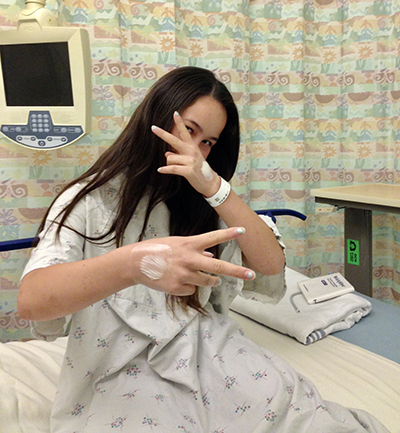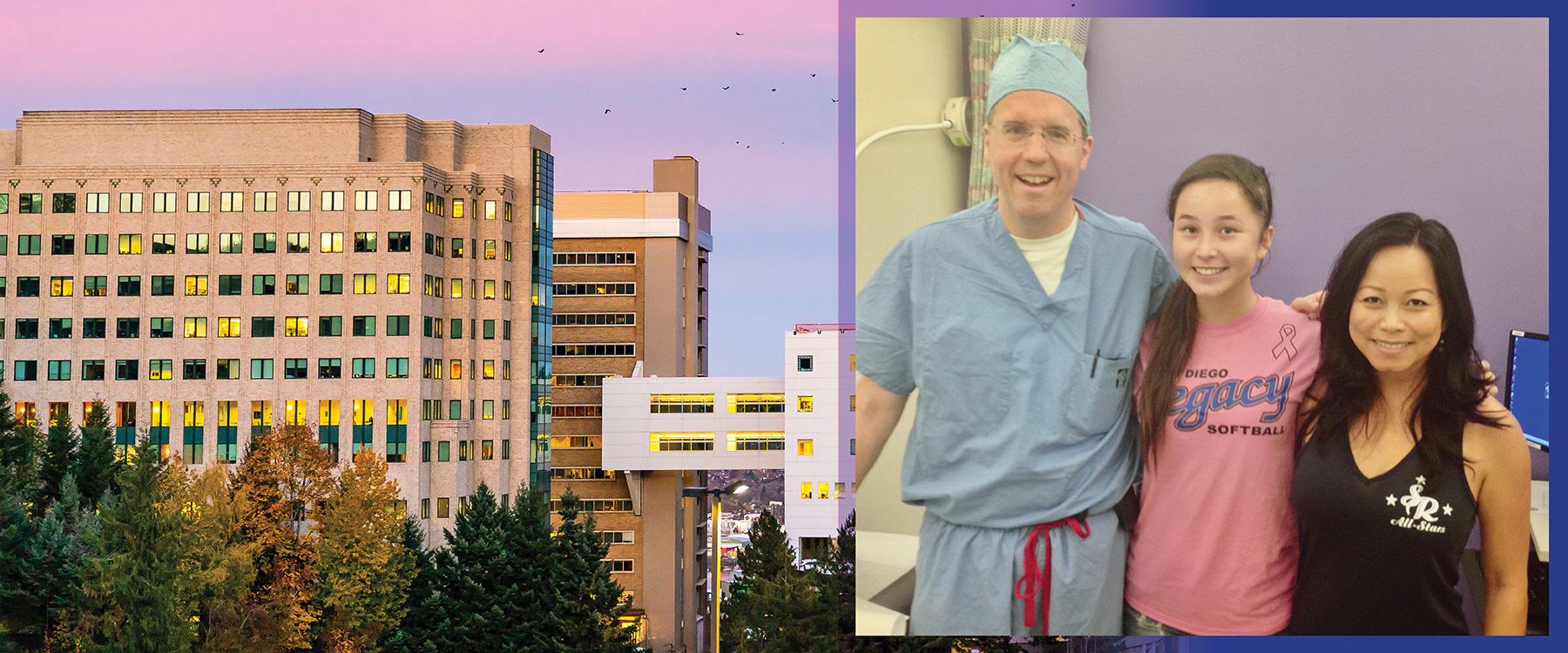Mindy Folkl will never forget the night in 2013 when she first noticed that something wasn’t right with her 13-year-old daughter, Julia.
“We were out to lunch, and I noticed Julia spacing out at the table. Her eyes weren’t tracking right, her faced turned red, and she didn’t seem to hear what I was saying,” said Mindy. “And then it happened again at bed time.”
Julia had always been a healthy, well-adjusted kid, and this strange behavior had Mindy spooked. The next day they got an appointment with their primary care doctor in San Diego. Her first question was, ‘What’s going on at home?’”
The reality was, things were hard at home. Mindy and Julia’s dad were finalizing their divorce. Assuming Julia’s symptoms were related to mental stress (she was not their regular doctor, so didn’t know Julia well), the doctor suggested that Julia see a psychiatrist.
“By eighth grade, I was thinking, I can’t do these advanced classes anymore. And it was heartbreaking because school was my main priority. The ability to try my best was taken away from me.”
Julia Folkl
But Mindy knew her daughter: this was not stress. She requested that the doctor perform an electroencephalogram (EEG), a test that measures electrical activity in the brain using electrodes attached to the scalp. The EEG showed that Julia was having seizures almost constantly. They gave Julia medication for her seizures right away, and ordered an MRI for the next day. The follow up from the MRI brought more bad news – a sizeable tumor on Julia’s brain was causing the seizures.
“After her diagnosis I sat down and I cried. Our world was falling apart. Words can’t even express how I felt. It was a rough time for us,” said Mindy.
Julia remembers the seizures well. “One time I was in history class and I could not understand what the teacher was saying. I had no idea what was going on. I remember raising my hand and saying, I’m really, really tired, I need to go to sleep. The teacher said, ‘Okay, you can just put your head down.’ After, I would get really tired. Now I understand that your body just wants to shut down after a seizure, because all the neurons have been firing like crazy,” said Julia.
With the diagnosis, Julia finally had a way to explain her disturbing experiences—and some hope for improvement. Her neurologist put her on medication to control the seizures, and it helped some. Yet, after two years and three different medications, the seizures had not stopped. And the side effects were interfering with her life.
“The side effects were nausea, dizziness, sleepiness, sluggishness. One of them even caused anger issues. By eighth grade, I was thinking, I can’t do these advanced classes anymore. And it was heartbreaking because school was my main priority. The ability to try my best was taken away from me.”
“One thing I will never forget is when Dr. Selden came out in his scrubs and said ‘The surgery was successful.’ I ran to him, in tears.”
Mindy Folkl
They knew it was time to consider brain surgery, and made an appointment with a highly-regarded brain surgeon in San Diego. But Julia and Mindy did not connect with him. He did not allay their fears or address their hesitation, and so they pushed off the decision a bit longer.
And then, finally, a chance encounter changed everything. Mindy ran into an old friend at her son’s baseball game.
“She asked how it was going with Julia and I told her we were looking for a new brain surgeon. She said her husband’s best friend was an incredible brain surgeon, but he was based in Portland. I emailed him that night and he responded 20 minutes later. What doctor responds on a Sunday night at 10:20? He said, if you can fly out here, I’ll see you. We arrived in Portland to meet him shortly after and scheduled surgery for a few weeks later,” said Mindy.
The family friend Mindy and Julia met as “Nate” happens to be Nate Selden, M.D., Ph.D., F.A.C.S, F.A.P.P., the Mario and Edith Campagna Chair of Pediatric Neurological Surgery at Doernbecher Children’s Hospital, and the department chair of neurological surgery at the OHSU School of Medicine. Julia was in good hands. Selden’s practice focuses on surgery for childhood epilepsy, brain tumors, and birth defects. He’s also a leading researcher — in 2006, he performed the first ever transplantation of neuronal stem cells in a human patient.
“When someone says I can’t do something, I’m going to do it. Just watch me. I was given a second chance in life and I’m going to make the most of it.”
Julia Folkl
The July after her eighth-grade graduation, Julia underwent a five-hour craniotomy at Doernbecher Children’s Hospital. Dr. Selden and his team removed a 3-centimeter lesion in her left temporal lobe.

“They shaved off a good chunk of my hair and cut into the side of my head,” remembers Julia. “I was so young, I didn’t really focus on the big things. I just wanted to know how the scar would look.”
The surgery went well. “One thing I will never forget is when Dr. Selden came out in his scrubs and said ‘The surgery was successful.’ I ran to him, in tears,” said Mindy.
Back in San Diego, it took some time for Julia to regain her confidence. Her reaction time was slow and she was struggling in school.
“It’s hard to learn when you’re trying to add new information on top of older information, but you don’t trust your brain to get the older information right,” said Julia.
It was a frustrating time, but slowly and steadily Julia regained her confidence. Sometimes she had to fight to convince others to believe in her. Her high school counselor urged her not to take AP classes, for example. She signed up anyway.
“When someone says I can’t do something, I’m going to do it. Just watch me,” said Julia. “I was given a second chance in life and I’m going to make the most of it.”
By her junior year she was taking AP and honors classes and playing catcher on her travelling softball team. And, like any other scholastically ambitious junior, she took the ACT and the SAT tests. Her scores were exceptional. But she wasn’t going to sit and wait to be noticed. She emailed the University of Chicago and asked them to come see her play softball – and they did. Her excellent softball skills + high test score + obvious grit landed her a place at the University of Chicago.
Today Julia is thriving as a computer science major at the University of Chicago and her future could not be brighter. Having won a competitive internship at General Atomics, a San Diego-based defense and technology company, she is now considering their generous post-graduation job offer.
“College is no joke. Especially computer science at a highly-ranked school. There’s definitely been times where I’ve wondered, How am I going to be able to get through this? And then I look back and say, You know what, I’ve made it this far,” said Julia.

